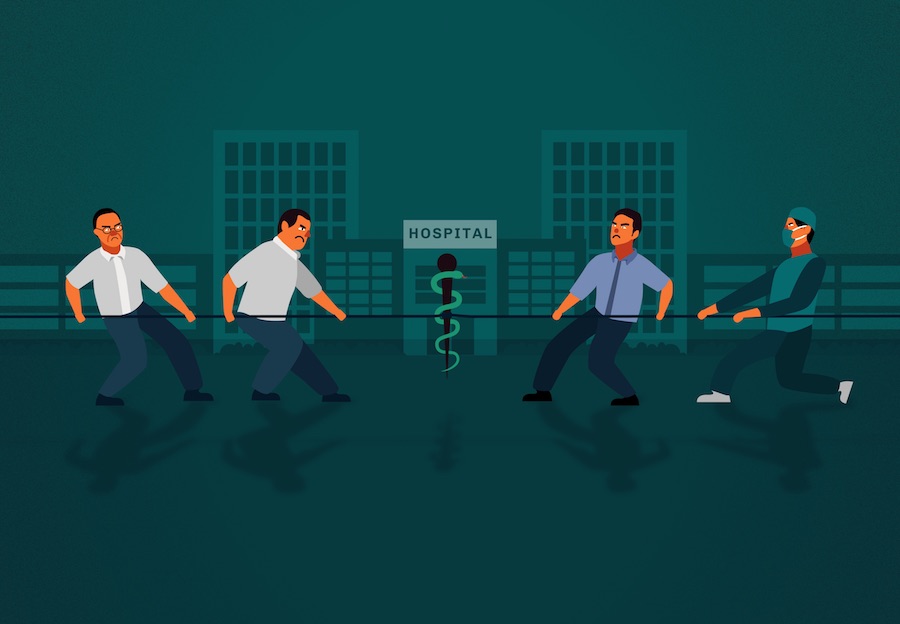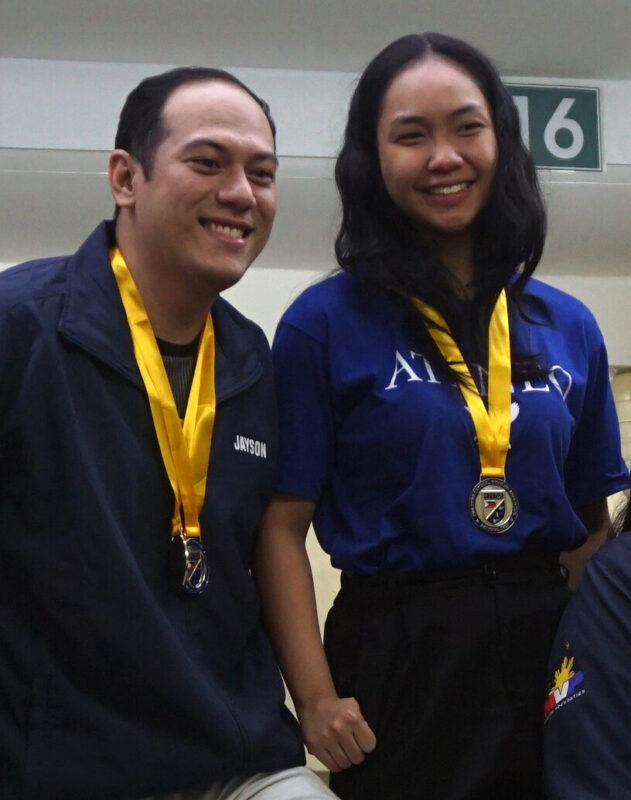THE PHILIPPINES recorded its first locally transmitted case of COVID-19 last March 6. Since then, authorities have set stringent measures to reduce infections. On March 14, Malacañang released a memorandum placing Metro Manila under an Enhanced Community Quarantine (ECQ). Two days later, the ECQ was expanded to cover the rest of Luzon. Though quarantines are being enforced, Department of Health (DOH) Undersecretary Maria Rosario Vergeire says cases of the virus may climb to 75,000 by June if not curbed.
The task of the frontliners—nurses, security personnel, and public servants—in containing the pandemic has been made harder by a shortage of personal protective equipment (PPEs) and testing kits for the virus. This came even as the DOH budget rose by nearly Php 7 billion. Stocks of PPEs and testing kits in the country have since been augmented by local and foreign donations.
However, the government’s responses to the health crisis were met with public confusion. Netizens cited the disorganized nature of the official dispatches on the imposition of curfews, as well as out-of-touch leadership. To manage the national health emergency, President Rodrigo Duterte enacted Executive Order No. 168—forming the Inter-Agency Task Force for the Management of Emerging Infectious Diseases in the Philippines (IATF). While the IATF works to curb the spread of COVID-19, its sudden creation begs the need for a permanent, central authority to combat global health threats.
Political tug of war
Despite intentions to assure the public, the wave of press conferences in the first week of the ECQ stoked public confusion due to seemingly uncoordinated statements from the national government.
For example, on March 14 , the Metro Manila Council passed a resolution to enact a curfew in the metro, later clarifying that no curfews can be enforced without ordinances from local government units (LGU). In response, the Department of the Interior and Local Government (DILG) Secretary Eduardo Año urged LGUs to defer to the DILG and DOH for the imposition of the ECQ. This lack of clarity set the tone for the government response to COVID-19, leading to disjointed efforts against the pandemic.
During an address to the nation on March 19, Duterte slammed LGUs for allegedly exceeding their authority with regard to quarantine policy. Duterte’s call against non-compliant LGUs followed Pasig Mayor Vico Sotto’s appeal to exempt tricycles from the ban on public utility vehicles. The appeal was made to help provide transportation for essential workers and those in need of urgent medical care.
Two weeks after Duterte singled out allegedly non-compliant LGUs, the National Bureau of Investigation (NBI) sent Mayor Sotto a letter asking him to explain a possible violation of the Bayanihan to Heal as One Act or R.A. 11469, which grants Duterte sweeping powers to combat COVID-19. In Sotto’s defense, citizens cited Article 3 Section 22 of the 1987 Constitution, which states that no one can be held liable for an act that is deemed illegal by the law prior to its enactment.
In another briefing held on March 19, Cabinet Secretary Karlo Nograles noted that LGUs must consult the DOH before acquiring, distributing, and using testing kits for the virus. Marikina City Mayor Marcelino Teodoro objected to the directive four days after Nograles’ statement, imploring the DOH to be more “proactive” by mass testing to identify the sick. Despite similar pleas from other public officials and scientists, Vergeire asserted that there is no need for mass testing. By April 4, the IATF announced plans to begin mass testing on April 14.
In a Laging Handa press briefing for updates on the COVID-19 pandemic, Año cited issues in communication with LGUs, leading to the impediment of the flow of all types of cargo. He added, “Malinaw naman iyong mga ibinigay nating guidelines, dapat ay susundin ito ng ating mga LGUs (The guidelines we gave were clear, they should be followed by our LGUs).”
Aside from tensions between the administration and LGUs, there also seems to be rising conflict within the national government as well. The NBI, for instance, also recently launched a probe against Vice President Leni Robredo. The investigation was prompted by Presidential Anti-Corruption Commission (PACC) Commissioner Manuelito Luna, who said Robredo’s efforts to aid frontliners “compete with, or [are] calculated to undermine national government efforts in this time of public health emergency and calamity.”
Duterte later defended Robredo’s actions in an address and fired Luna.
The spotlight that the Office of the President has placed, not just on LGUs, but also on Robredo brings to light the lack of trust and communication between different government offices during this pandemic.
Centralized program
To address supply issues and public health crises as a whole, Albay Representative Joey Salceda proposed House Bill 6096 to establish a local Center for Disease Control and Prevention (CDC). The proposed agency will be organized similarly to its counterpart in the United States of America (USA). It will also perform the role of “developing and applying communicable disease control and prevention initiatives.”
Aside from this, CDC’s objective is to assess and aid LGUs in “preventing the emergence and transmission of communicable diseases.” In line with this, the new agency would be tasked to streamline and standardize the responses of LGUs—an issue that IATF and the Office of the President have struggled with amid the pandemic.
Aiming to strengthen the bonds between the national government and LGUs as well as to prepare the state for health emergencies such as the COVID-19 outbreak, the proposal details the establishment of a Health Emergency Coordination Council (HECC) within the new CDC. Thus, HECC shall coordinate the response of the national government in times of health emergencies. Alongside the HECC, managing pandemics would fall under the National Health Emergency Response Unit (NHERU), which will act as the “frontline force in ground and surveillance operations of the CDC.” This means it will serve as the first response unit during a public health emergency and verify reports of infectious diseases.
House Bill 6096 also emphasizes the creation of a Sudden Onset Health Emergency Management Plan, which will act as a framework that the government will follow in light of any public health emergency. In line with this, the bill also calls for the formation of the Sudden Onset Health Hazards and Emergencies Management Service to oversee the NHERU during a health crisis with the main function of collaborating with CDC’s operations in public health emergencies.
With the strife between LGUs and the national government in combating the pandemic, the introduction of a CDC may greatly aid in the fight against communicable diseases such as COVID-19.
Potential preparedness
Countries like South Korea, having identified similar gaps, established agencies akin to that of the USA’s CDC. The Korea Centers for Disease Control and Prevention (KCDC), for instance, has led largely successful initiatives—like mass testing and travel restrictions—to contain the virus. The agency also assigned hospitals dedicated to treating COVID-19 patients to further isolate the sick.
KCDC initiatives effectively “flattened the curve” or slowed the rate of infection. These steps have been hailed as an example to follow. Korean officials and foreign experts pin the country’s successful response on clear communication of guidelines and protocols with the public, mass testing in lieu of public quarantine, and experience in dealing with outbreaks such as the Middle East Respiratory Syndrome coronavirus. The KCDC’s swift, effective, and clear promulgation of protocols and guidelines for the government and its citizens greatly contrasts the Philippines’ disjointed approach to the COVID-19 pandemic.
As COVID-19 cases surge, the IATF has increasingly taken on new roles in the management of the health crisis. However, without a central authority to combat infectious diseases such as COVID-19, it is unclear whether improvements in fighting future pandemics will take place.




